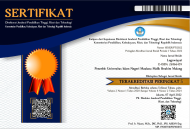EFEKTIFITAS PENGGUNAAN ARTIFICIAL INTELLIGENCE (AI) DALAM PEMBELAJARAN BAHASA ARAB DI ERA SOCIETY 5.0: SYSTEMATIC LITERATURE REVIEW
Abstract
This research aims to determine the effectiveness of using Artificial Intelligence (AI) in learning Arabic in the era of Society 5.0. The approach used is a concept analysis approach with the Systematic Literature Review (SLR) method, which consists of 8 stages, namely identification of research questions, developing research protocols, establishing database locations, selection of relevant studies, selecting quality studies, extraction of data from individual studies, synthesis of results, and presentation of results. Meanwhile, this research shows that the application of Artificial Intelligence (AI) in learning Arabic in the era of Society 5.0 is efficient and helpful in supporting the learning process. Among them, it can help in correcting errors in Arabic texts, helps search for material, references, questions, journals/articles, and digital books, it increases students' learning motivation because it is exciting and fun, supports language practice and understanding, helps practice speaking, writing, and gets instant grammar explanations, corrects their mistakes quickly and effectively, translates Arabic texts, helps in data analysis and understanding the context of Arabic texts, improves good use of the language, supports conversation practice, provides feedback and reference sources and learning tools with features that enrich the process of learning Arabic.
Full Text:
PDF (Bahasa Indonesia)References
Adhasita, N., Sari, V. P., Putri, H., Ayunda, Y., & Bukhori, B. (2023). Revolusi Mental: Membangun Peradaban Masyarakat Bermoral Profetik Di Era Society 5.0. At-Taqwa: Jurnal Pendidikan Dan Islamic Studies, 1(2).
Amalia, P., Majid, H. A., & Sahrah, I. A. (2024). Peran Teknologi AI dalam Pengembangan Kemampuan Berpikir Kritis Mahasiswa. 3, 26–31.
Anas, I., & Zakir, S. (2024). Artificial Intelligence: Solusi Pembelajaran Era Digital 5.0. J-SAKTI (Jurnal Sains Komputer Dan Informatika), 8(1), 35–46.
Aprilia, R., Massofia, F. D., & Hasaniyah, N. (2024). ANALYSIS OF ARABIC TRANSLATION DIGITAL DICTIONARY APPLICATIONS IN THE ERA OF SOCIETY 5.0. LUGAWIYYAT, 6(1), 56–68.
Fatmawati, F., Sari, M. N., Setianti, Y., Saleh, K., & Pitra, D. H. (2024). Peran Artificial intelligence (AI) dalam Personalisasi Proses Pembelajaran Mahasiswa di Pendidikan Tinggi. Journal on Education, 6(4), 20148–20157.
Fikri, S., & Al-Furqaan, D. L. (2023). The effectiveness of song translation in increasing vocabulary to develop speaking skills at SDN 1 Paciran. Lugawiyyat, 5(2), 73–84. https://doi.org/10.18860/lg.v5i2.21895
Francis C, F. C., & Baldesari. (2006). Systematic Reviews of Qualitative Literature. UK Cochrane Centre.
Hamim, H., Ma’arif, A. S. M., & Mishbahuddin, M. (2024). النحت المعاصرة والاستفادة منه في تعليم المفردات اللغة العربية لغير الناطقين بها. Lugawiyyat, 6(1), 1–13. https://doi.org/10.18860/lg.v6i1.26638
Kitchenham et al, K. (2009). Systematic Literature Reviews in Software Engineering-A Systematic Literature Review. 51(1), 7–15.
Massofia, F. D., Khoirunnisa, D. A., Dinanti, S. D., Huda, M., & Rahmawati, R. (2023). Pembelajaran Bahasa Arab Menggunakan Smart Apps Creator Untuk Kelas VII Madrasah Tsanawiyah. LUGAWIYYAT, 5(2), 123–133. http://dx.doi.org/10.18860/lg.v5i2.23501
Moleong, L. J. (2007). Metodologi Penelitian Kualitatif Edisi Revisi.
Nurhayati, N., Suliyem, M., Hanafi, I., & Susanto, T. T. D. (2024). Integrasi AI dalam collaborative learning untuk meningkatkan efektivitas pembelajaran. Academy of Education Journal, 15(1), 1063–1071.
Nurullawasepa, M., Mandani, N. Z., Adawiyah, R., Al Ayyubi, S., & Abdillah, A. A. (2023). AI (Artificial Intelligence) dalam penerjemahan teks Bahasa Arab. SENRIABDI, 141–157.
Perry, A., & Hammond, N. (2002). Systematic Review: The Experience of a PhD Student. 2(1), 32–35.
Putri, A. N., & Hasan, M. A. K. (2023). Penerapan kecerdasan buatan sebagai media pembelajaran bahasa arab di era society 5.0. Tarling: Journal of Language Education, 7(1), 69–80.
Rahayu, S., & Al Hadi, K. (2023). Pelatihan pemanfaatan Artificial Intelligence (AI) untuk keefektifan presentasi yang menarik dan komunikatif. Jurnal Pengabdian Magister Pendidikan IPA, 6(4), 1268–1271.
Rahman, S., Sembiring, A., Aulia, R., Dafitri, H., & Liza, R. (2023). Pengenalan ChatGPT untuk Meningkatkan Pengetahuan Siswa-Siswi di SMK Negeri 1 Pantai Labu. Prioritas: Jurnal Pengabdian Kepada Masyarakat, 5(01), 1–7.
Rahmawati, F. A., & Amaliza, F. R. (2023). Tathbiiq Wasilah al-Ta’liim Puzzle Envelope fi Ta’allum al-Lughoh al-Arabiyyah li Thullab Madrasah Budi Mulia al-Mutawassithoh al-Tsaaniyah Yogyakarta. LUGAWIYYAT, 5(2), 111–122. https://doi.org/10.18860/lg.v5i2.20905
Ramadhan, A. R. (2023). Strategi penggunaan chatbot artificial intelligence dalam pembelajaran Bahasa Arab pada perguruan tinggi di Indonesia. Jurnal Oase Nusantara, 2(2), 77–86.
Retnawati, dkk, H. (2018). Pengantar Analisis Meta. Parama Publishing.
Rohim, A. F., Maslamah, M., & Qosim, M. N. (2024). Penggunaan Kecerdasan Buatan untuk Pembelajaran Bahasa Arab yang Adaptif dan Terpersonalisasi. MODELING: Jurnal Program Studi PGMI, 11(2), 371–379.
Rohmawaty, E. N., Hilmi, D., Uqba, M. S. S., & Saleh, U. S. (2024). Peran Artificial Intelligence (AI) dalam Pembelajaran Bahasa Arab Mahasiswa Pascasarjana UIN Maulana Malik Ibrahim Malang. Khatulistiwa: Jurnal Pendidikan Dan Sosial Humaniora, 4(3), 316–328.
Salam, M. Y., Putri, N. A., Mudinillah, A., & Rahmadhani, K. (2023). Implementasi Pembelajaran Bahasa Arab Berbasis Kecerdasan Buatan dalam Konteks Smart Learning. Proceedings Series of Educational Studies, 125–134.
Saudagar, F., & Sadikin, A. (2023). Pelatihan Teknologi Artificial Intelligences (AI) bagi mahasiswa magang kependidikan MBKM FKIP Universitas Jambi. Jurnal JUPEMA, 2(2), 45–51.
Simon, A. S. (2023). Prospek Pembelajaran Bahasa Arab di Era Generative Artificial Intelligence. Assuthur: Jurnal Pendidikan Bahasa Arab, 2(2), 49–58.
Sugiyono, S. (2012). Metode Penelitian Kuantitatif Kualitatif dan R&D. Penerbit Alfabeta.
Toifah, N. (2021). Camtasia studio: Software multimedia dalam pembelajaran menyimak Arab di era industri 4.0. Tarling: Journal of Language Education, 5(1), 71–91.
DOI: https://doi.org/10.18860/lg.v6i2.29713
Refbacks
- There are currently no refbacks.
Indexed By ;
--------------------------------------------------------------------------------------------------------------------------------------------------------------------------------------
Program Khusus Pengembangan Bahasa Arab
Gedung C (Prof. Dr. H. Mudjia Rahardjo., M.Si.) Lt. 1
Jl. Gajayana No 50 Kota Malang, Jawa Timur, Indonesia, Kode Pos 65144,

Lugawiyyat Journal is licensed under a Creative Commons Attribution-ShareAlike 4.0 International License .






